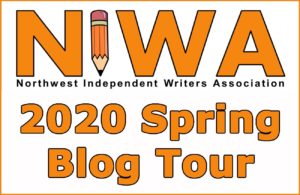Writing Essentials: Organizing Your Approach to Marketing
This is Suzanne Hagelin’s final post in a six-week blog tour series for the Northwest Independent Writer’s Association. NIWA serves Pacific Northwest writers working to achieve professional standards in independent writing, publishing, and marketing.
Behold the secrets to instant success! How to make every marketing dollar count! Rocket to the top of the NYTimes bestseller list and STAY there!
I have no idea how to make any of that happen, but maybe I can save you some wasted money and effort. Marketing is complex and some ‘secrets’ lose their potency by the time they’ve reached you. There probably are expensive courses you can take that would make all the difference, but how will you know which ones are going to work for you and which ones are a waste of money—or worse, a fleecing operation that strips newbie authors of their limited cash?
The best I can do is point you in the right direction and give you some tips on getting started.
Research
How does the news get out for books in your genre?
What works for one doesn’t necessarily work for another. Mysteries aren’t the same as science fiction. Memoirs and self-help aren’t marketed the same way as fantasy and humor.
One place to start is visiting bookstores in person and online. Look for books in your genre and see which ones catch your eye. Try searches on Amazon, Google, Barnes & Noble, Kobo, and others. Don’t assume you have to compete with the books that show up on top. Each store has a different feel and clientele. All you’re doing is familiarizing yourself with it.
Mailers. Get on a number of email lists targeting your genre, check them daily, read their blurbs, click on the ones that appeal to you as a reader, and buy some books you are genuinely interested in reading. As you figure out how to pick books you like, watch how they promote them. Look at the covers and the blurbs. Are there words and phrases that consistently engage you? Have you begun to identify ‘red flags’ that mean you won’t like the book? It may take a while, but at some point, you’ll be able to scan through the books for sale quickly and pick out the best ones. You’ll also get a feel for well written blurbs. While this doesn’t automatically lead to writing good blurbs, it’s still valuable.
There are many mailers for readers out there. My current favorites are BookBub and Bargain Booksy. I’m also on the Book Barbarian list and quite a few author newsletter lists. Authors often share sales on their own and other authors’ books as well as giveaways and contests where you can pick up free or discounted books.
Talk to Authors. Author-networking is one of your most valuable resources. As you’re setting up strategies to test, ask some of them for input. They could save you from wasting time or give you hints that will increase the benefit.
Be careful. If you’re considering paying for training or a service to help you promote your book, please look them up first and find out if they are reputable. Talk to other authors in author groups, check out websites like Writer Beware. Don’t buy something blindly.
Ads
Not quite ready for ads yet? No problem! Practice writing blurbs and ad copy. No matter where or how you market your book, you need succinct phrasing to spark readers’ interest and help them catch your idea quickly. And it’s not easy to learn.
Ad copy and pitches. Novelists don’t usually have any background in writing ads, but this skill is the most valuable one you can develop in your marketing. No one else is as invested in your book as you are or will take the time to hone a good pitch.
You need more than one pitch. One-liners, two-liners, headline-style, individual words, short descriptions. Look for tropes and catch-words readers will recognize. Keep a file with a number of variations on your ad copy and come back to it periodically to make new attempts. Use it for testing ads and for social media posts. Try them out in person, pitching your book to a friend or acquaintance.
I had the help of some author friends in coming up with my main pitch for selling “Body Suit” in person. I often use it for ads as well. It starts with a twist on a cliched phrase and highlights two key parts of the story: “A riches to rags adventure of a clever woman in a high-tech suit versus a hostile AI”. I had to memorize this and practice giving it multiple times before it came fluidly to my lips—and it continues to sell the book to people who like that kind of thing.
Here are two examples of some delightful pitches:
“What happens when the Chosen One dies in chapter 1?” Unchosen
“It’s about a snarky, sarcastic fortune-teller who hates people. So of course she’s the one who has to get the group together to save the world.” The Fallen
There are lots of resources you can tap to help you learn to write better pitches and ad-copy but in the end, you’re training your mind to think this way and it’s worth the time it takes. This is an important part of your marketing strategy.
Places to Advertise
There are lots of places to advertise your book; here are a few key ones to consider. Remember that expenses can add up rapidly and it’s important to test out ads with small budgets to narrow down that best approach. This can be a time-consuming process.
Amazon —Amazon gives good metrics and updates quickly so it’s easy to see how your ads are doing, that is, how many clicks it’s getting. If you’ve uploaded your eBook to KDP, it will show you the conversion into sales.
FaceBook —Some genres work better than others with FaceBook ads, I’ve heard. I don’t have much experience with them. Nice graphics can make a difference.
BookBub —BookBub ads reach a lot of readers and are easily targeted toward the kind of readers that would like your book. You can associate it with well-known authors in your genre. If someone wants to find something like “The Lord of the Rings” and searches on “Tolkien”, your ad will show up if you chose his name in the author search. I like this feature a lot.
Book Mailers —You can apply for ads or featured deals in mailers. This is where your research into mailers will come in handy. Once you’ve identified the ones that fit your genre and preference, check out their requirements for applying for deals and submitting ads. Some of them will be much more affordable than others. The cost is usually linked to exposure and overall success of their ads.
When making your ad plan, you’ll need to consider several things: where to place ads, what to emphasize, whether to offer a free book or a discounted one, how much to spend, and how to measure results. You may have heard a lot about ROI (return of investment) but in the beginning, you need to focus more on learning what is successful than making money.
Investment in your learning curve is worthwhile.
Networking
Befriend and support other authors. Read and review books. Follow them on social media and share posts if you like their books. Set up newsletter swaps and blog tours with authors in your genre. Authors are always coming up with new ways to work together to promote books.
I have found the Northwest Independent Writers Association to be a great resource for getting to know other authors in my area, working with them, learning from them, and sharing with them.
Author Reputation
Building your reputation as an author is more than just getting fans who love your writing. Connecting online makes it easier to promote books and maintain a following. There are a number of ways to do this.
Here are a few:
- Newsletters. Get your own mailer going and build a list of people who are there because they like the books you write and help promote. This is also a great way to work with other authors, promoting each other’s books, and increase your reach.
- Blogging. Support your reputation and build your online presence by having a place online where people can find free content you’ve shared.
- Social Media. There are many platforms where you can build a reputation and raise interest in your work through frequent posts. Is there one you prefer? Focus on that one and add it to your marketing strategy. Facebook, Twitter, and Instagram are very popular with authors for a reason. They’re free, versatile, and a great place to test out your marketing ideas.
Another word of caution. It’s easy to spread yourself too thin. I know authors who are brilliant at balancing posts on multiple social media platforms and I’ve made attempts at learning some of their techniques. But I’m not able to keep it going so it hasn’t been effective in gaining me readers. I’ve decided to address it in the future because it’s an important component in online reputation and sales. For now, I’m juggling enough as it is.
Other Marketing Approaches
Social Media marketing is a whole topic on its own. There’s no end to how you can promote your books in creative ways. An author friend of mine, for example, decided that she wanted to give away 10,000 copies of the first book in her five-book series. Normally, you would pay a well-established book mailing list quite a bit for the privilege of giving away that many copies. She came up with some ideas using social media, swaps, and a couple of smaller mailer ads, and accomplished her goal in a number of weeks. I’m sure it took a lot of hard work and ingenuity. And there’s no question it gave many new readers a chance to discover her popular series, Adaline, (which I love by the way).
Be strategic
Come up with three or four different ways to market your book and plan a trial run for each. Test them one at a time. If they are successful and you are ready to continue with them, make them a part of your marketing plan. If they don’t fit your current limitations, set them aside and check them again at a future time.
It’s better to work on one strategy at a time and build it solidly, than to have many wimpy ones bleeding you of time, creativity, and money.
I’ve barely scratched the surface here but at least this give you a good place to start.
The first post in this series is “Writing Essentials: Organizing Your Mind”. You can read the second installment here, “Writing Essentials: Organizing Your Time”, the third here, “Writing Essentials: Organizing Your Plot”, the fourth here, “Writing Essentials: Organizing Your Publication Process”, and the fifth here, “Writing Essentials: Organizing Your Approach to Sales”.
Graphic made with photos by NASA Hubble and by Victor He on Unsplash
=====
 USA Today bestselling author of hard science fiction, Suzanne Hagelin, lives in the Seattle area where she runs a small press, Varida P&R, and teaches language on the side.
USA Today bestselling author of hard science fiction, Suzanne Hagelin, lives in the Seattle area where she runs a small press, Varida P&R, and teaches language on the side.
Her Books. The Silvarian Trilogy Book 1, “Body Suit” is available for 99c in April only and the audiobook is Downpour’s current Editor’s Pick at $4.95. Book 2 “Nebulus” just released on audio, and Book 3, “The Denser Plane” is in the writing stage. The Severance begins with “Cascade” and will be followed by “Eclipse”.
LINKS—Suzannehagelin.com, Suzanne’s Blog, Newsletter, Twitter, FaceBook, Medium




